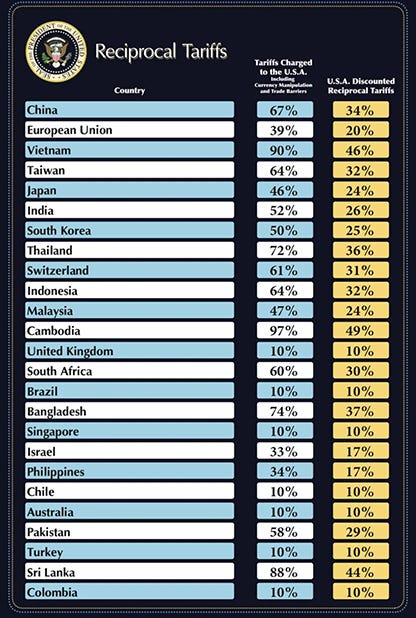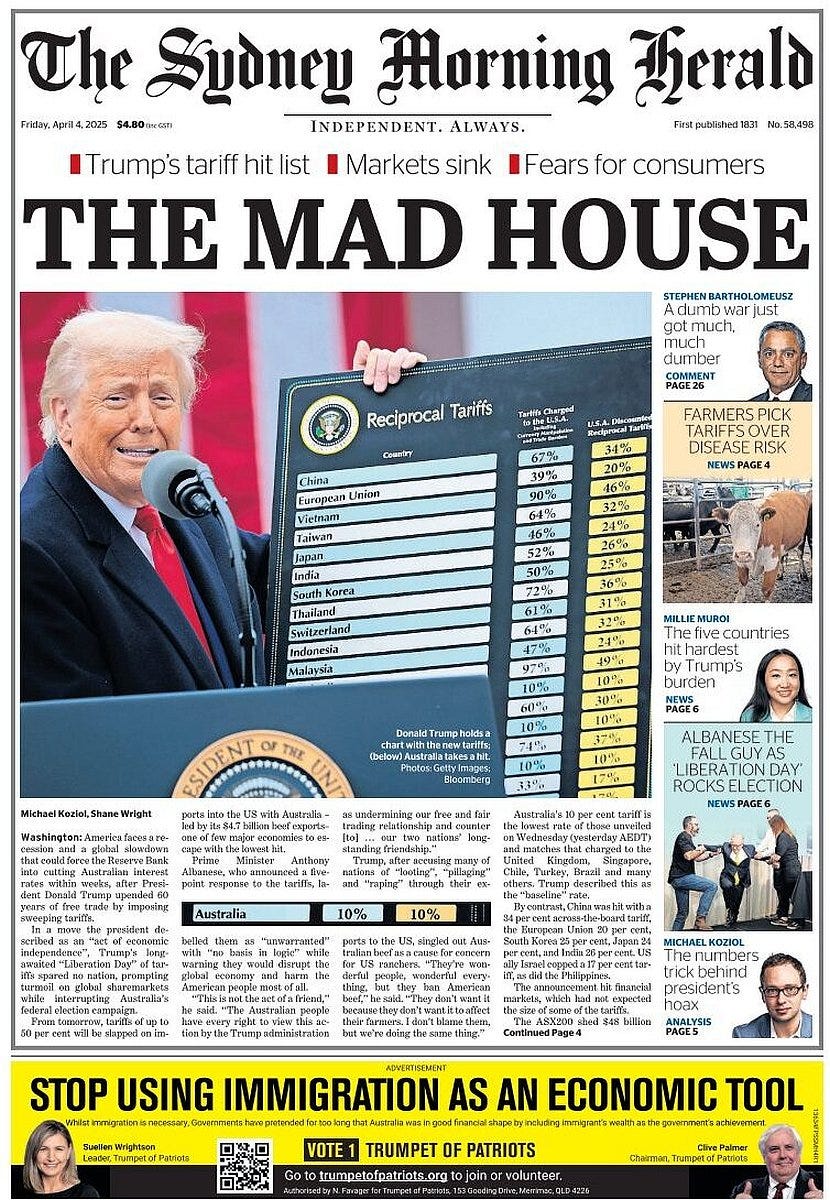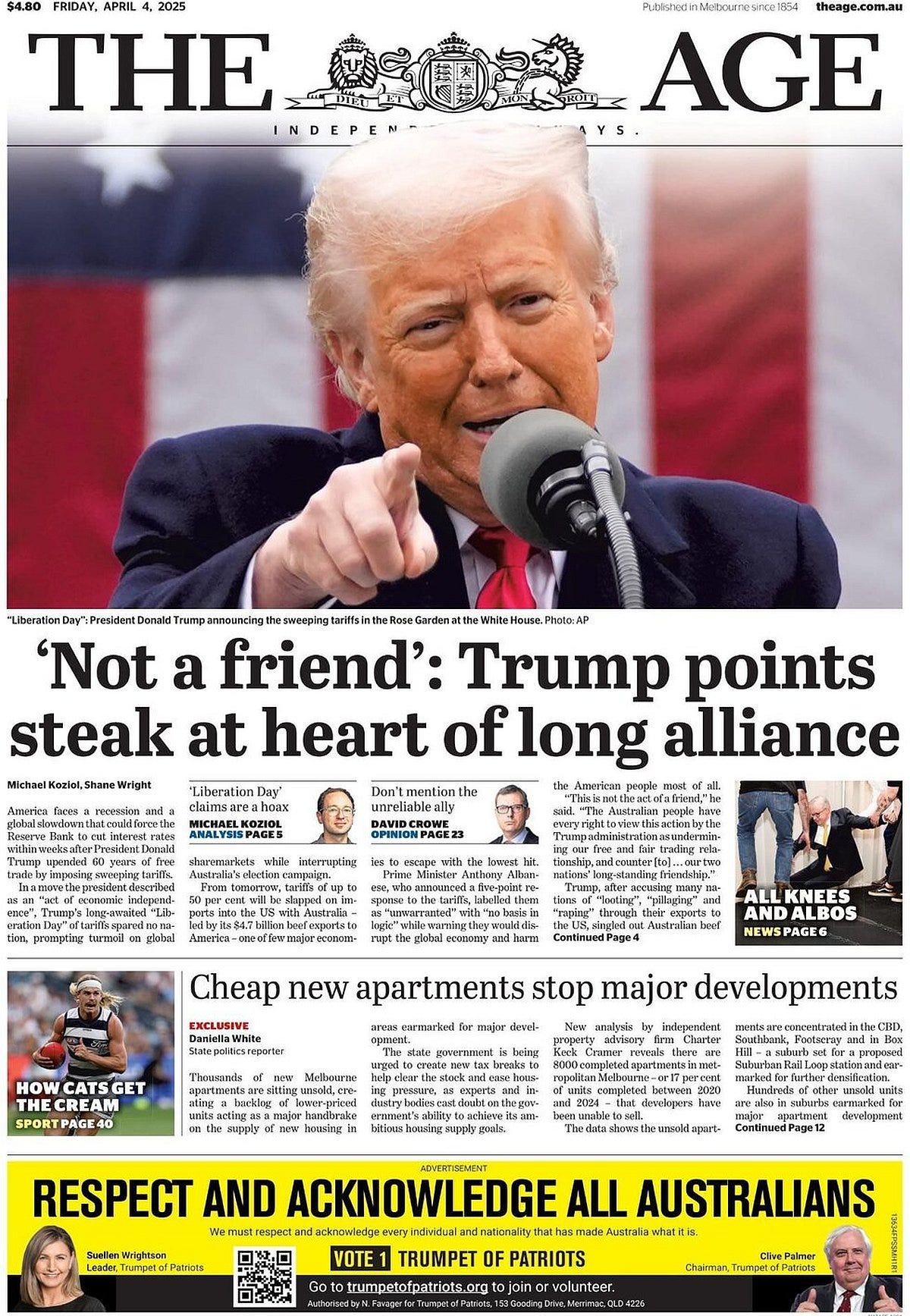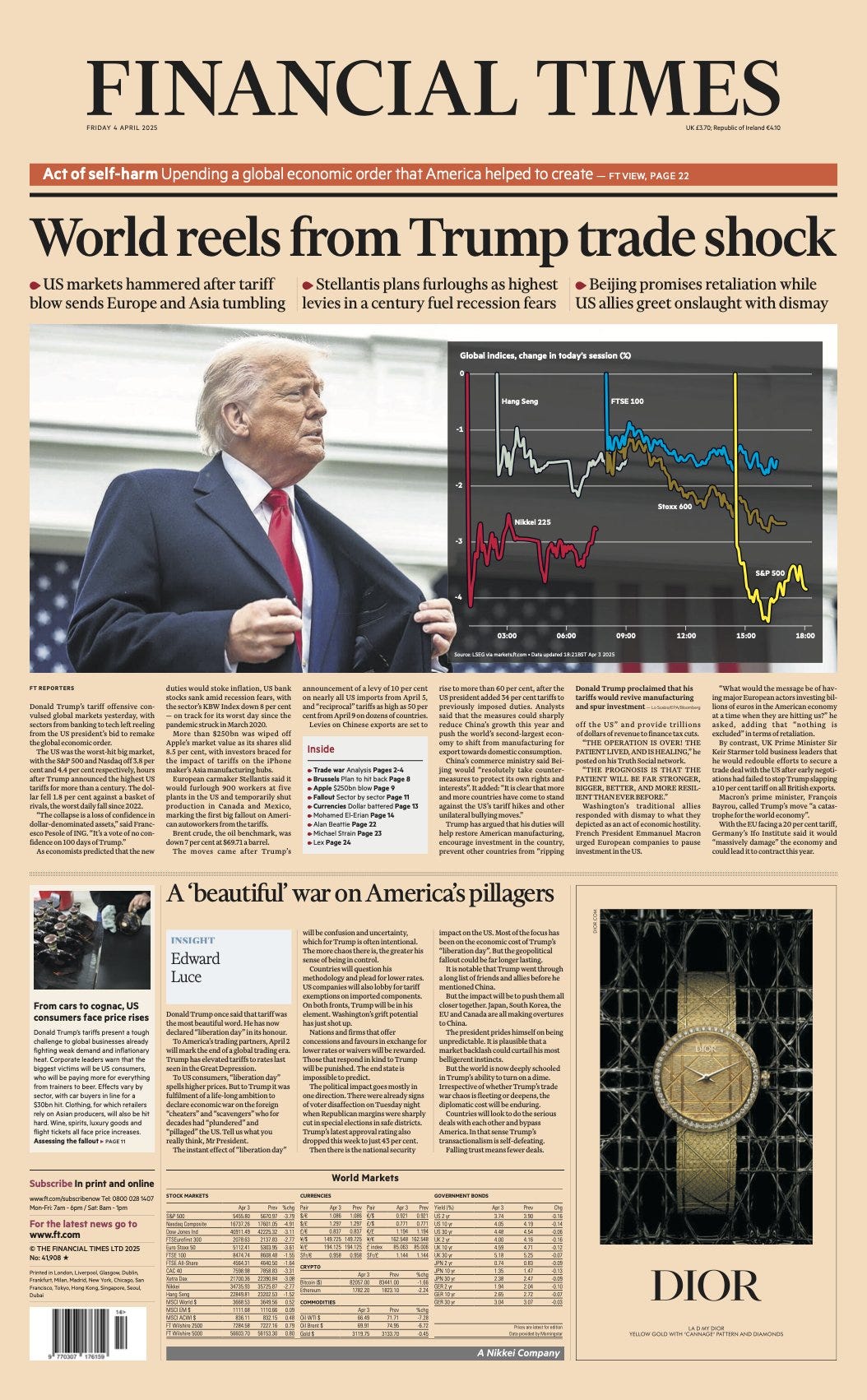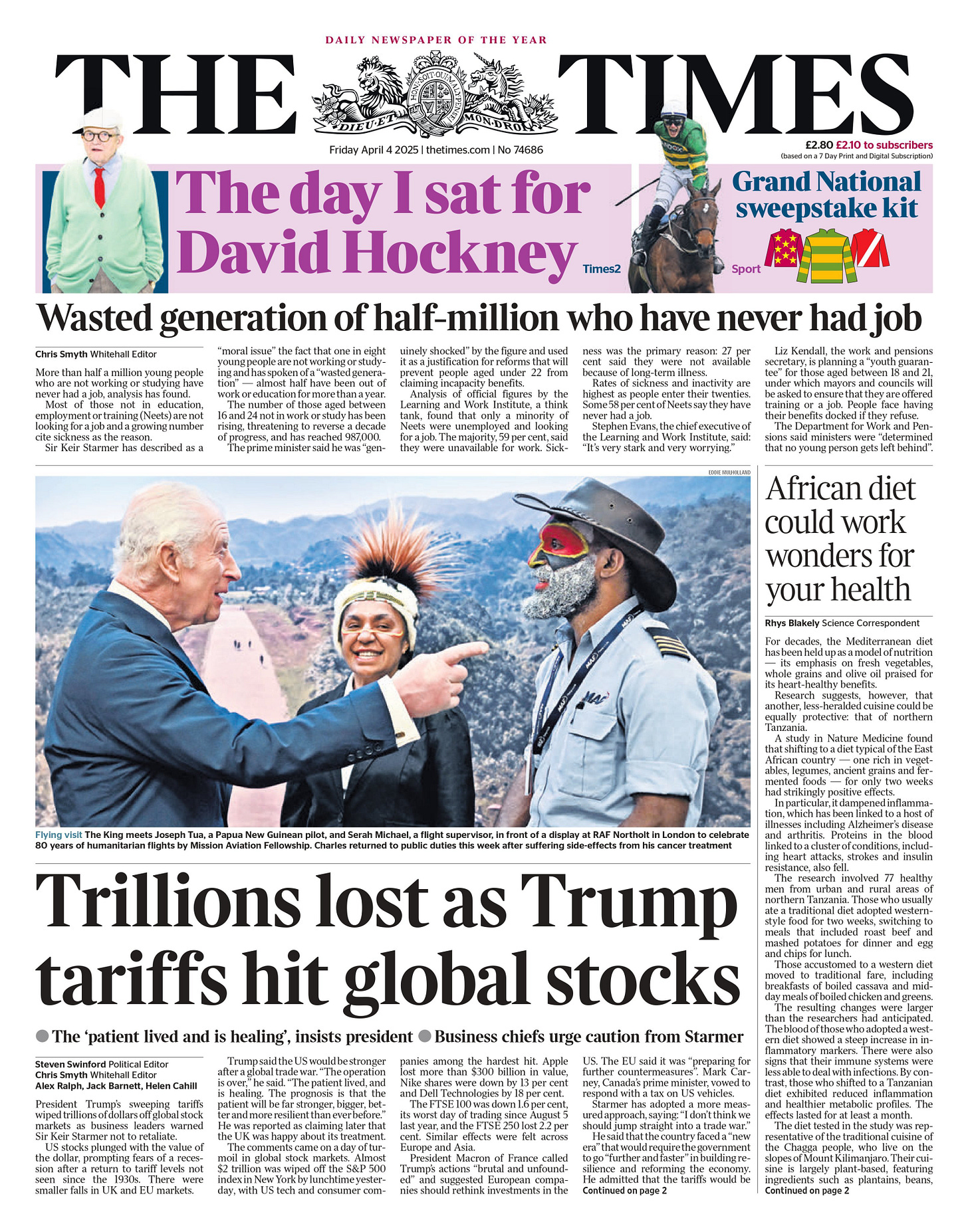World Trade Heads for 'Law of the Jungle'
JPMorgan says a global recession is more likely to happen than not this year thanks to the tariffs. Tiny Lesotho hard hit.
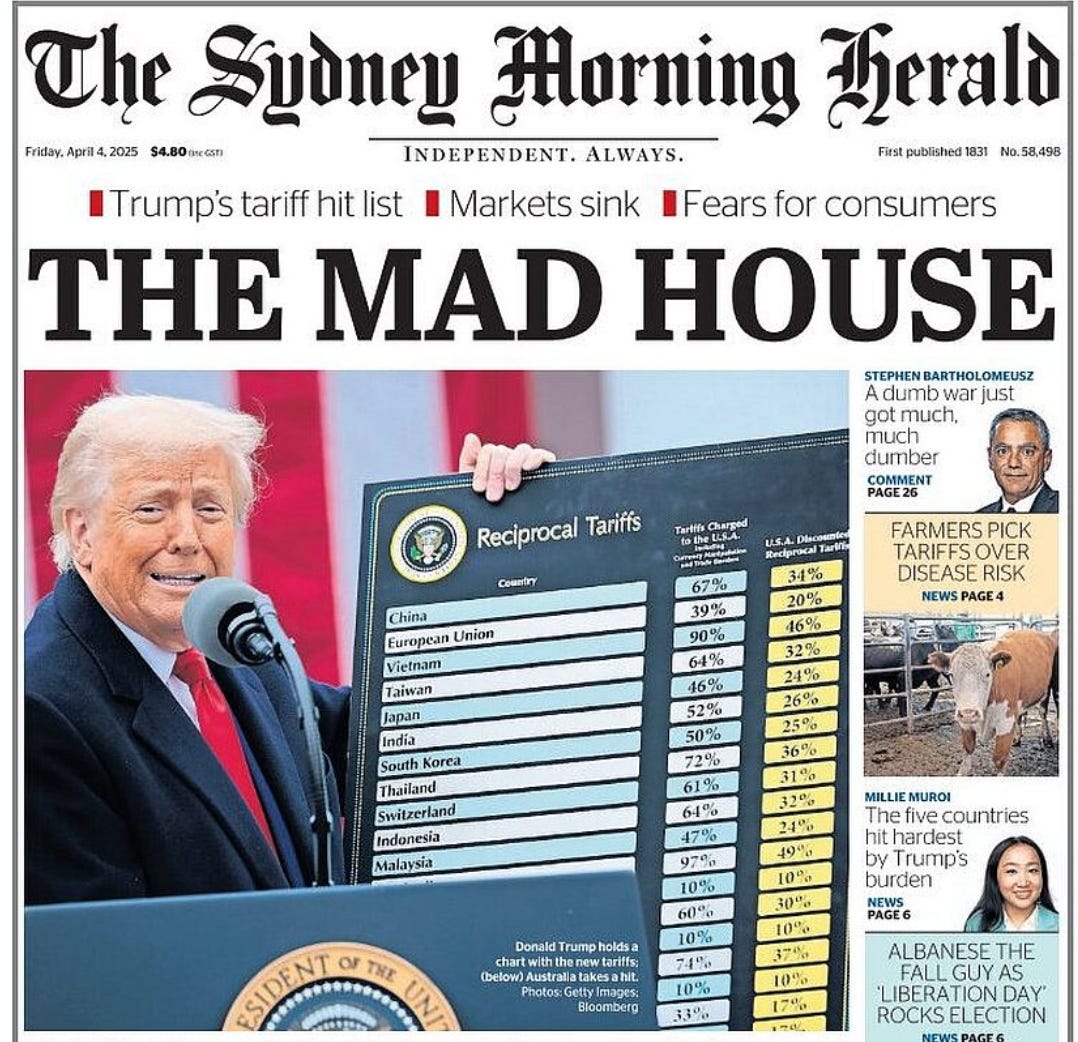
U.S. President Donald Trump’s ‘Liberation Day’ tariff blitz swept away roughly a $3.5 trillion worth of market capitalization from listed companies in Japan, Europe and the U.S., making it the worst day for those stock markets since March 16, 2020. The ripples were felt around the global markets, especially here in Asia. JPMorgan says a global recession is more likely to happen than not this year thanks to the tariffs
Benchmark stock indexes in Asia continued to fall on Friday, after Trump's reciprocal tariffs swept trillions of dollars in market capitalization from Japanese, European and U.S. market in one day, Nikkei Asia reported. In Tokyo, the benchmark Nikkei Stock Average dropped 965.64 points, or 2.8%, from the previous day's close at one point to 33,770.29, an intraday low since Aug. 6, 2024. This follows a 2.8% loss on Thursday. Singapore's ST and Vietnam's VN slid 2.6% and 5.8% at one point respectively.
A global recession is more likely to happen than not this year, thanks to Wednesday’s tariff broadside from the U.S. According to the Wall Street Journal, JPMorgan analysts raised their forecasts to 60% Thursday. That’s up from 40% before Donald Trump’s announcement sent markets tumbling.
U.S. Commerce Secretary Howard Lutnick appeared on TV programs on Thursday, justifying those tariffs. "This is the reordering of fair trade," Lutnick said. "I expect most countries to start to really examine their trade policy towards the [U.S.] and stop picking on us." The secretary's words added fuel to investors' concerns. Europe's STOXX fell 3%, while Dow Jones Industrial tanked 4% on Thursday.
According to a data from QUICK FactSet, Thursday's fall swept away roughly a $3.5 trillion worth of market capitalization from listed companies in Japan, Europe and the U.S., making it the worst day for those stock markets since March 16, 2020. Back then, the crash came due to fears that the COVID-19 pandemic might freeze global economic activities. This time, it was an artificial blow. - Nikkei Asia
The US dollar fell to its weakest level since October on Thursday, wiping out its gains since Trump’s reelection in November. Tariffs in theory should boost the dollar, but investors’ concerns that the United States is creating a self-inflicted wound that would stymie its long-term growth sent the dollar sinking against other global currencies. “They’re ignoring every rule of classic micro and macro economics. This is the policymaking equivalent of a suicide bomber,” Michael Block, market strategist at Third Seven Capital, told CNN’s Matt Egan. Investors poured money into safe-haven assets. Gold surged to a new record Wednesday above $3,160 a troy ounce. Gold, which hovered above $3,100 a troy ounce Thursday, is up 19% this year and just posted its best quarter since 1986 - CNN
Donald Trump’s blitz slapped a 49% tariff on goods imported from Cambodia, the highest rate of the numerous tariffs. Other countries facing sudden tariff increases include Vietnam at 46%, Sri Lanka at 44%, Bangladesh at 37%, China at 34%, India at 26%, South Korea at 25%, Japan at 24% and countries in the European Union at 20%. The US is Cambodia’s largest export market, accounting for 37.9% of the Kingdom’s export value, followed by Vietnam at 13.8%, China at 6.7% and Japan at 5.4%. In 2024, Cambodia exported goods worth $9.92 billion to the US, up 11.4%, while US imports to Cambodia amounted to $264.15 million, up by 2.7%. Total bilateral trade volume between the two nations reached $10.18 billion, a rise of 11.2% over 2023. The vast majority of Cambodian exports to the US consist of clothing, travel goods and footwear - Phnom Penh Post
What do these taxes mean for Asia and for Singapore? The tariffs bombshell has escalated the trade war, with consequences that will go far beyond trade, writes Singapore Straits Times’s Vikram Khanna. These levies are also expected to impact Asian countries the most. And while the tariff of 10 per cent on goods from Singapore is arguably smaller than other countries’, it is generally seen as having an impact on growth if global trade and economic activity slow down significantly.
Fernando Ching Lau, a Los Angeles supermarket owner, says Trump’s immigration crackdown had already hurt his business – with fearful families avoiding stores. The vortex of uncertainties is forcing businesses from Guangdong to Los Angeles to reconsider development strategies - SCMP
The Trump administration has imposed a steep 50 percent tariff on Lesotho, a small, impoverished African nation of two million people – the highest tariff levied on any country. The measure delivers a severe blow to Lesotho’s economy, which relies heavily on exports for its modest $2bn gross domestic product (GDP). Trump’s new tariffs were calculated based on the US trade deficit with each country, divided by the total value of imports from that nation. As a result, smaller economies with limited imports from the US – such as Lesotho and Madagascar – were hit hardest. Lesotho’s trade surplus with the US is largely driven by diamond and textile exports, including Levi’s jeans. In 2024, its exports to the US totalled $237m, accounting for more than 10 percent of its GDP, according to Oxford Economics. Meanwhile, the Trump administration claims Lesotho imposes a 99 percent tariff on US goods. Thabo Qhesi, a Maseru-based independent economic analyst, said the US tariff on Lesotho “is going to kill the [country’s] textile and apparel sector”, its largest private employer. “If the closure of factories were to happen, the industry is going to die and there will be multiplier effects,” Qhesi said. “So Lesotho will be dead, so to say.” - Al Jazeera
“They’re (the Trump team) ignoring every rule of classic micro and macro economics. This is the policymaking equivalent of a suicide bomber” - Michael Block, market strategist at Third Seven Capital
South Korea's Constitutional Court on Friday decided to oust President Yoon Suk Yeol, upholding parliament's impeachment motion over his short-lived imposition of martial law last year that sparked the country's worst political crisis in decades. With Yoon's ouster, a presidential election is required to take place within 60 days, according to the country's constitution. Prime Minister Han Duck-soo will continue to serve as acting president until the new president is inaugurated. The ruling caps months of political turmoil that have overshadowed efforts to deal with the new administration of U.S. President Donald Trump at a time of slowing growth - Reuters
NATO intelligence sources say Russia is stockpiling missiles for a fresh strike on Ukraine. A senior NATO official told European Pravda that while drone strikes have become the norm, a lull in missile strikes has allowed it to replenish stocks. He said Russia was undoubtedly continuing to manufacture a large number of missiles, including ballistic ones, and was also purchasing additional supplies from North Korea. He cited intelligence data that confirmed this ongoing production and accumulation.
Protesters displayed a banner calling Myanmar's junta chief a "murderer" as he joined a regional summit in Bangkok on Friday, a week after a huge earthquake killed thousands, leaving desperate survivors pleading for food and shelter. More than 3,000 people are confirmed dead after the 7.7-magnitude quake, and the United Nations (UN) estimates that up to three million may have been affected in some way -- many left without shelter after their homes were destroyed. Many nations have sent aid and rescue teams, but on the ground in some of the worst-hit areas there is little sign of Myanmar's ruling military helping survivors. Junta leader Min Aung Hlaing will hold talks with leaders from Bay of Bengal littoral nations at a plush Bangkok hotel on Friday. The decision to invite him has drawn criticism, and outside the venue protesters hung a banner from a bridge reading: "We do not welcome murderer Min Aung Hlaing." - Bangkok Post
The head of Radio Free Europe/Radio Liberty said that the US government had switched off a satellite that transmitted its Russian-language programme into Russia. The Prague-based station, founded by the United States during the Cold War to counter Soviet propaganda, has seen its funding frozen by US President Donald Trump amid a drive to slash the size of the federal government. RFE/RL won a temporary restraining order in court, but the US Agency for Global Media, the US government agency that oversees its operations, has not yet released funding. “We came into work today and saw that satellite services that reach into Russia had been turned off by USAGM,” RFE/RL chief executive officer Stephen Capus told AFP. The decision affects the 24-hour Russian-language “Current Time” broadcasts to Russia, Ukraine, Central Asia, eastern Europe and other regions. “USAGM notified RFE/RL that satellite contracts carrying Current Time to Europe were terminated,” Mr Capus added. Mr Capus said that the radio’s Russian clients were now getting a red TV screen with a sign: “We regret to inform you that US Agency for Global Media (USAGM) has decided to terminate the distribution of Current Time.” RFE/RL currently reaches almost 50 million people in countries with authoritarian regimes including Belarus, China, Iran or Russia, seeking to counter the official propaganda. Mr Capus said the radio had other means of reaching the Russian audience. “But... this wasn’t the Russian government taking such an action. This was ordered by the USAGM,” he said. RFE/RL put many staff on reduced-pay leave on April 1 as it waited for the USAGM to disburse US$77 million (S$100 million) the radio needs to keep running until October - RFE/RL
A federal judge March 28 blocked the Trump administration from shutting down the agency overseeing Voice of America, arguing that the dismantling would expose its journalists to retribution in their home countries, among other risks. Judge J. Paul Oetken of the U.S. District Court for the Southern District of New York cited evidence submitted by the Committee to Protect Journalists in an amicus brief that same day showing that at least nine journalists and media workers who worked for or contributed to VOA or its regional outlets have been killed in connection with their work since 2003, while nine others have been imprisoned. “Plaintiffs’ fear of retribution from their home countries appears far from fanciful,” Oetken wrote. The amicus brief was submitted in collaboration with the Reporters Committee for Freedom of the Press (RCFP). CPJ and RCFP also jointly submitted a brief in defense of The Associated Press's access to the White House and other briefs against the shuttering of RFE/RL and VOA - CPJ
Experts and analysts told CNN the scam center industry in SE Asia that faced a highly publicized crackdown in February will only come back stronger. Around 7,000 people were released from scam centers run by criminal gangs and warlords operating along Myanmar’s border with Thailand, where many are held against their will and forced to work conning ordinary people, including American citizens, out of their life savings. Those included in the releases are a fraction of an estimated 100,000 people trapped along the border. “Billions of dollars are being invested in these kinds of businesses,” said Kannavee Suebsang, a Thai lawmaker leading his country’s efforts to release those held in scam centers. “They [the scam syndicates] will not stop.” The scam underworld, analysts say, is agile and professional, and is rapidly expanding cyber fraud operations through illicit online marketplaces to target new demographics of victims. “Fundamentally, this is a situation the region has never faced before,” said John Wojcik, an organized crime analyst at the United Nations Office of Drugs and Crime. “It’s clear that the evolving situation is trending towards something far more dangerous than scams alone – and rolling out at an unprecedented scale if left unchecked.” There is also evidence of Asian crime syndicates expanding into other parts of the world, with networks found in parts of Africa, South Asia, the Gulf, and the Pacific, according to the UNODC. “These syndicates are quickly maturing into more sophisticated cyber threat actors capable of deploying malware, deepfakes and other powerful tools, fuelled by the rise of new illicit online markets and crypto-based laundering services,” said Wojick.
Hotel reservations for one of Thailand’s major holidays - the Songkran Festival (April 11-17) - have dropped by 25% compared to last year, according to the Thai Hotels Association (THA). The decline in bookings is attributed to safety concerns among both Thai and foreign tourists following the earthquake in Myanmar on March 28, which caused significant tremors in several northern and central regions of Thailand. As a result, the THA estimates that around 689,000 fewer tourists are expected during this year's Songkran Festival. Foreign tourist bookings have also decreased. A total of 32,244 room nights have been reserved for Songkran, compared to 42,761 room nights during the same period last year - The Nation




